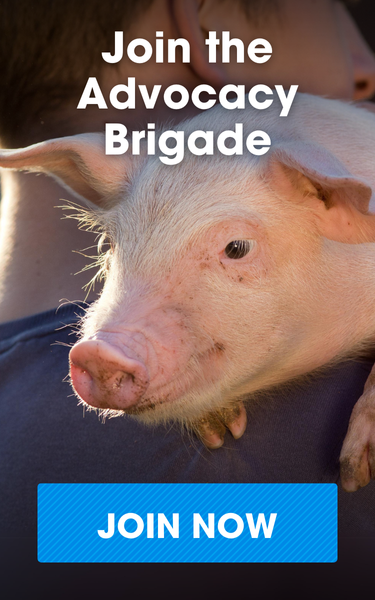
Holiday Compassion Means Helping Farm Animals, Too

For many, the holiday season is a time for giving—and not just gifts. People donate toys and coats, volunteer time and energy and contribute to charities that help other people in many ways. But when we aim our compassion, it’s important to include at-risk animals, as well—and not just dogs and cats. In fact, with one trip to the grocery store, we can help vulnerable animals, our environment and humans at the same time.
It starts with realizing that, each year, more than 9 billion farm animals are raised in horrendous and often cruel conditions to create food products. Idyllic images, words and labels on food packages may paint ideal pictures of animals living peacefully on small farms, but the truth is a much different story. The vast majority of animal products come from farms using inhumane confinement and breeding practices that emphasize production efficiency over animal welfare. Egg-laying hens and mother pigs are kept in cages so small that they cannot turn around or stretch their limbs. Dairy cows and chickens have been bred to produce so much milk and meat that they suffer from painful physical conditions like sores and lameness.
These unhealthy, unnatural and stressful conditions can also be directly tied to the spread of diseases in our food supply, unsafe working conditions, environmental pollution and even antibiotic resistance in humans.
These issues may seem insurmountable given powerful food interests and a perceived cultural appetite for cheap food. But there are levers of positive change, and they start with you, the consumer. First, if you choose just one plant-based meal, dish or ingredient to replace a meat, egg or dairy item, you take an important step toward reducing the demand for inhumane farming and forcing the food industry to improve their practices.
If you do eat or plan to serve meat, eggs or dairy this season, make sure they come from farms that adhere to standards of meaningful welfare certifications like Animal Welfare Approved, Certified Humane and Global Animal Partnership (steps 2 and above). In addition to banning cruel practices like caging and crowding, these programs require environments that allow animals to express natural behaviors and verify all standards through in-person audits. The certifications also provide full transparency by making all of their standards accessible online.
By choosing these verifiably higher welfare options, you may also be incentivizing major food brands to follow suit. Some of the largest food companies in the world—including Nestle, Burger King and Walmart—are now making concrete commitments to improve animal welfare. Elevated public values are transforming the ways these and other food companies do business, a trend that will only increase over time as the public becomes more and more aware. Studies show that most consumers do not want animal cruelty to be included in the price of purchasing animal food products.
Ideally, the holidays give us all an opportunity to reflect and act on generosity, compassion and kindness. This year, I encourage you to expand the impact of those impulses by shopping with your heart and considering all the animals who deserve more than another season of suffering.

